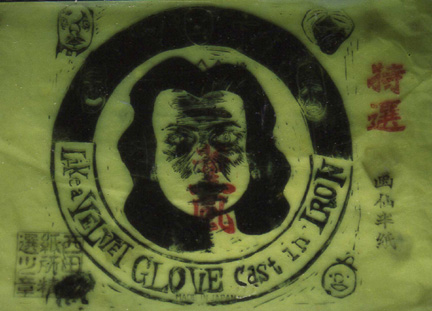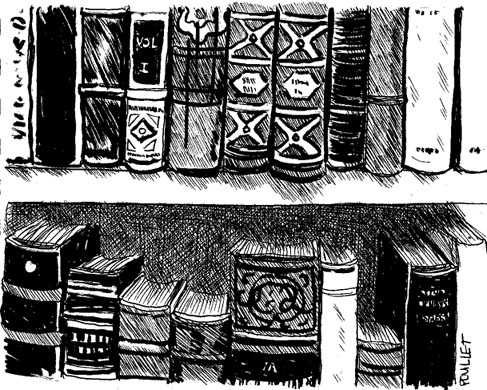|
|
|||||
|
|
Paperback Jukebox – The
Sportswriter by Richard Ford
I've been reading a lot of badasses lately. I'm talking characters like Philip Marlowe, CW Sughrue and Jimbo Stark. Characters who, no matter how they deceive themselves and others, are never stalled from action by the angst of undeveloped self-awareness. Characters whose flaws are so literally drawn, so seamlessly accepted and so thoroughly defining that their brashest, most violent movements swing through the novel with the grace and inevitability of a grandfather clock's pendulum. These characters do things; they can carry a book across the country and back a dozen times if necessary. These characters have lyrical voices that allow for tough and irresistible prose stylings. These characters are fun to read and, it is obvious, to write. Frank Bascombe is not one of these characters. Sughrue, Stark and Marlowe are, themselves, justifications. They act the way they do simply because they are who they are. 'Nuff said. They operate in reaction to the terrible fact that it is impossible, as Stark himself says at the end of The Silver Ghost, "to make anything up to anybody." Frank Bascombe has yet to accept this terrible fact and for this reason he doesn't do much of anything and his story, as told by Richard Ford in The Sportswriter, is itself his justification. Bascombe, like most of us, admires these badasses. He respects and envies the single-minded purposefulness of the athletes he gets to know. He salutes their disciplined self-obsessions. He interviews them and hones both his questions and their answers until they support the myth that his subjects exist entirely within a focused universe of pure, disciplined athletic qualities. The sensibility that led Bascombe to this brand of work also causes him to set a high bar for his own personal life. He fails to reach this bar. He is haunted by the differences he recognizes between the sort of literal engagement that he admires and his own biographical failings: a painful divorce, an aborted novel, a life in Jersey. Each of these failings has a common theme: through them, Bascombe eliminates uncertain conditions, and with them, he tries to tell himself that he is moving toward a simpler, more literal life. He abandons the challenging unpredictability of the city for the stable, home-owning routine of the suburbs. He splits with the strong-willed, physical and intelligent woman to whom he was married and takes up with a woman he treats like a child, a woman to whom he clearly feels intellectually superior. He tosses aside the vast uncertainty of his novel in order to write brief, far-from-probing articles for a glossy weekly. Bascombe knows that each of these decisions is cowardly, and the novel's indictment of American hyper-individuality (and its narrative swoop) gains its power from the quicksand ease with which Bascombe's circumstances allow (encourage) him to use his cowardly decisions to justify himself. At the other side of America from these circumstances stand Marlowe, Stark and Sughrue, fascinating and heightened emblems of a national myth based on badass individuality. They live lives of sustained action that rarely bow to unnecessary speculation. Their decisions are split-second and seldom reconsidered. You could almost keep score of their stories, as though their fictional lives were sporting events. Frank Bascombe, like Fred Exley before him, is a fan of such sporting lives. He aspires to their purity of vision, their sharp, clear-purposed and athletic stare. Unlike Marlowe, Stark and Sughrue, however, Bascombe is prohibitively terrified of literalness. He is too blisteringly intelligent to not know that the moment he sees clearly enough to name a thing is the moment that he is forced to recognize, once and for all, that whatever this is, it is it. His horror of this it gives the novel its power and weight, and makes Frank Boscombe the type of character most meaningful to read, and most difficult to create: the human kind.
Brendan Kerr comes to Pittsburgh via Elkins, West Virginia and Brooklyn, New York. He is currently working on revision of his novel, 'The Uses of Talent' and rocking with the band Workshop. He lives in Polish Hill.
Paperback
Jukebox –Like a Velvet Glove Cast in Iron by Daniel Clowes
Recently, after returning home from a
trip to Philadelphia with my lady-friend, P., we presented her roommate T. with
a package of little tank-shaped fireworks. Almost immediately, we three, along with T.’s buddy M., headed through
the Pittsburgh dusk for the alley—oddly named Decision Way—that runs alongside
their house.
Once
back inside after a rather fiery tank-battle, P. said that T. lighting the
tanks and us all watching was like a scene out of a Wes Anderson movie, or else
like a scene from Like a Velvet Glove
Cast in Iron. A bit confused, I
asked, “What’s Like a Velvet Glove Cast
in Iron?” T. and P. exchanged
knowing glances, then P. smiled, said, “I’ll be right back,” and ran upstairs
to her studio.
I started reading Like a Velvet Glove…the next day and was hooked from the
get-go. I had read Ghost World, Clowes’ later, more popular work, and had enjoyed it
very much, but there was something I liked about Like a Velvet Glove…even better. I suppose it was the dark magical realism/surrealism—which I’m kind of a
sucker for—in the Like a Velvet Glove…story. The strange twists and kooky characters
reminded me of something out of a Borges tale, a David Lynch film, or a Dylan
song. And the unbridled fun of the
narrative and the joke-y conspiracy-theory reminded me somewhat of Pynchon ala The Crying of Lot 49.
Several of the pages of P.’s copy were
indeed loose, and some were placed back in the wrong order, but—as she had
assured me—all the pages were there. Actually, it felt like the book—due to its frenetic content—was meant to
be read with pages misplaced throughout. It made sense for one of the characters to say, at one point, “So anyway…how
does this all fit together…this stuff and the Nazis…and Value Ape,” when I
hadn’t read anything about Nazis in the previous fifty or so pages.
I guess another thing I liked about
the book so much was that I related to the main character, Clay. While his saga of friends with fish-tale
eyes, unwarranted police-brutality, Ann Landers-killing cults, merman-sex, and
dogs with no orifices is far stranger than my life, the premise at the heart of Like a Velvet Glove…is Clay’s pursuit
of an ex-lover he happened to spot in a movie. And I’m also kind of a sucker for futile love stories.
I tried to take my time reading Like a Velvet Glove…because I wanted to
make it last, but I still flew through it in a little over a week. Fortunately for me, Clowes has a pretty
large oeuvre. Tonight, I’m returning to
P. her copy of Like a Velvet Glove…and
tomorrow, I’ll start reading Clowes’ David
Boring.
Paperback Jukebox – Fargo Rock City: A Heavy Metal Odyssey in Rural North Dakota by Chuck Klosterman
When I heard that
Chuck Klosterman would be discussing and signing his latest release, Chuck Klosterman IV: A Decade of Curious
People and Dangerous Ideas at Joseph Beth Booksellers on July 11, I knew it
was time to complete the Klosterman catalog. Of his four books, the only one I
hadn’t read was Fargo Rock City: A Heavy
Metal Odyssey in Rural North Dakota.
I am not particularly interested in heavy
metal. In fact, I kind of hate it. There was a period a few years ago when I
had the computer savvy and tools to burn CDs, so I often did for my heavy
metal-loving cousin, Fritz. Somehow these songs weaseled their way into my
iTunes, and thanks to the shuffle feature, I would be studying in the Cathedral
of Learning and Skid Row’s “Monkey Business” would screech over my ear buds. It
was not pleasant.
But the book’s topic hardly deterred
me, because I can not think of many times that I’m happier than when I’m reading
something by Chuck Klosterman. Usually this wit-induced euphoria that his
writing brings on only lasts in small doses, five to ten minutes, as I read
something on espn.com or in his column in Esquire.
He could write a 1,200 page panegyric of Skeletor and I would read the entire
thing enraptured. I found Sex, Drugs, and
Cocoa Puffs two summers ago while on vacation with my family in Nags Head,
and rather than continue along shopping for miniature lighthouse knickknacks or
pirate-themed souvenirs, I paced around the labyrinth of decks winding through
the Scarborough Faire shopping complex, completely absorbed in Klosterman's
collection of essays. In the first essay, he bemoans “John Cusack Love” that he
claims renders any relationship in reality unsatisfying and calls Chris Martin
of Coldplay a “sleepy eyed bozo”; I was hooked. Since then, reading a
Klosterman book in the summer has become a tradition of sorts. It's the
literary equivalent of a blockbuster movie. It's light, it's easy, and I
usually conclude the experience with a power ballad stuck in my head.
Fargo
Rock City is a memoir disguised as a pop culture and
musical genre analysis. Klosterman weaves in stories of his childhood in
Wyndmere, North Dakota, where he says that a legitimate fear among the town’s
children was not sex or drugs, but that their parents’ farms would foreclose. I
didn’t grow up in a town so different than this. My high school was proud to
sponsor “Drive your Tractor to School Day” each May. I could identify with Klosterman’s stories of just literally
driving around for entertainment on weekends. (In New Castle, we called it
‘cruisin’ the diamond.’) While I never liked heavy metal, I will always love
and staunchly defend Queen. If someone today asked me if I had a hero, I would
reflexively think “Freddie Mercury.” In addition to being an interesting
exploration of a genre largely ignored by critics, this is also just a book
about how we will always love the bands we loved as children, even if we don’t
still display the CDs or have the posters above our beds anymore. And as campy,
and silly, or even bad (and I am in
no way suggesting Queen is bad) as we know these bands to be, we’ll never quite
love any music the same way as the music we loved growing up.
As narrow as the topic may be, Klosterman
makes an argument relevant to anyone who has ever debated the parameters of
“important” art. Klosterman argues that heavy metal was important art because
it was important to him, and more
than that, important to a lot of people. Despite the criticisms volleyed at
metal—that it is derivative, misogynistic, or even satanic—it was significant
to a large number of people, and that makes it important.
This book will
probably make you pop in a CD of the band you first fell in love with. At the least,
you’ll have “Dr. Feelgood” stuck in your head for a few days, which is
guaranteed to add an intangible “awesomeness” to your stride.
 Alicia Barnes is a recent graduate of the University of Pittsburgh, where she studied English Literature and Nonfiction writing. She plans on going to Prague to teach English and write in the near future. She doesn’t believe in going to bed angry and she makes a mean cranberry sauce. |
||||



